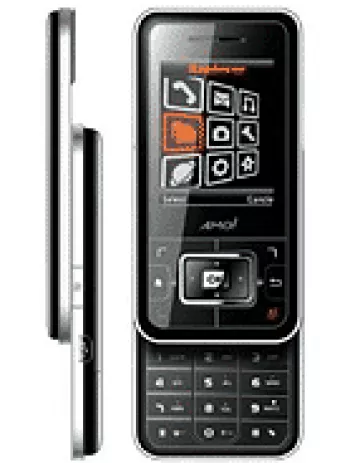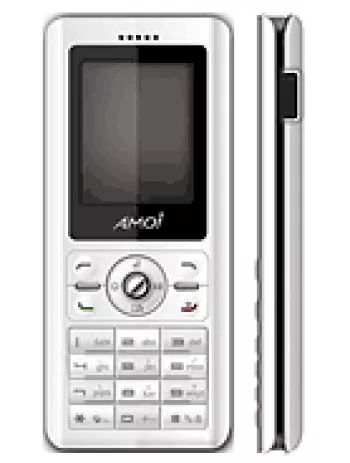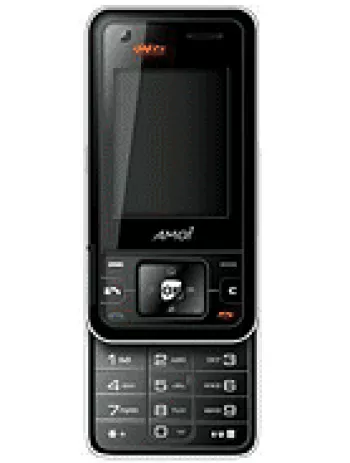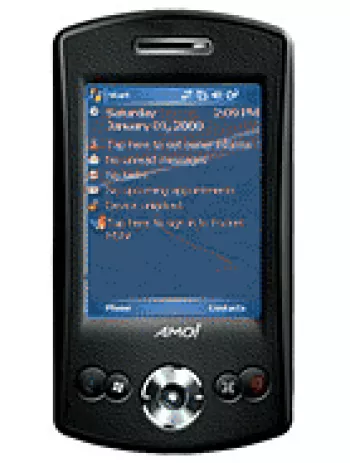
Overview of Amoi E850
The Amoi E850, announced in the second quarter of 2006, is a classic piece of technology that reflects the transitional period of mobile devices towards more sophisticated handheld systems. Though it has been discontinued, this device holds historical significance as one of the Windows Mobile-powered smartphones that attempted to bridge the gap between functionality and affordability. With a modest range of features, the Amoi E850 was designed to cater to basic communication needs while introducing users to the convenience of a touchscreen and mobile computing capabilities.
Design and Build
The Amoi E850 sports a solid form factor with dimensions measuring 102 x 54 x 20 mm and weighing approximately 108 grams. This makes it fairly compact and easy to carry, even when compared to modern smartphones. The device is equipped with a Mini-SIM slot and features a TFT resistive touchscreen measuring 2.4 inches, which was quite standard for phones of that era. The screen supports 256K colors, although only 65K are effective, delivering a resolution of 204 x 320 pixels (~158 ppi density). Its black exterior gives it a sleek, minimalist appearance.
Display Features
The relatively small display size of 2.4 inches offers a ~30.6% screen-to-body ratio, which is a clear indication of the design focus during the mid-2000s. Despite its modest size and resolution, it provides sufficient clarity for performing basic tasks such as navigating the user interface and reading messages. However, the resistive nature of the touchscreen requires a stylus or a firm press with a finger, which was quite common in devices prior to the widespread adoption of capacitive touchscreens.
Performance and Hardware
At the heart of the Amoi E850 is the Intel XScale PXA 272 processor clocked at 312 MHz. While this may seem underpowered by today’s standards, it provided adequate performance for running the Windows Mobile 5.0 operating system smoothly. This OS was specifically developed for PocketPC Phone Editions, enabling basic smartphone functionalities.
The device includes 64MB of RAM and 128MB of internal ROM storage. Users looking to store additional data could expand storage using the dedicated microSD slot. The combination of these hardware components was designed to ensure a balance between performance and power efficiency, addressing the primary needs of its time.
Camera Capabilities
The Amoi E850 features a 2 MP main camera, equipped with an LED flash for capturing images in low-light conditions. While this may not compare to the multi-megapixel cameras available in contemporary devices, it was adequate for casual photography. The ability to record videos with this device was a notable feature, despite the absence of a front-facing selfie camera.
Connectivity Options
In terms of network connectivity, the E850 supports GSM technology with 2G bands in the 900, 1800, and 1900 frequencies. For data transfer, it relies on GPRS Class 10. Unfortunately, the device does not support EDGE or advanced high-speed internet connectivity options. In terms of local connectivity, it includes Bluetooth 1.2 and an infrared port for data transmission. However, it lacks WLAN and positioning technologies, typical of entry-level devices from its era. Additionally, it includes a USB 1.1 port for physical connection to a PC for synchronization and data transfer.
Battery Life
The phone is powered by a removable Li-Ion 1100 mAh battery, which offers a standby time of up to 150 hours and a talk time of approximately 4 hours. While modern smartphones might provide significantly longer battery life, the optimization of power consumption in the Amoi E850 reflects the typical usage pattern where extended standby times were prioritized over continuous use.
Multimedia and Additional Features
For personal entertainment, the E850 supports downloadable polyphonic ringtones and MP3 files. Notably, it lacks a loudspeaker and instead focuses on vibration alerts and ringtone notifications. The absence of a 3.5mm audio jack suggests reliance on external Bluetooth accessories for audio output. The device includes a WAP 2.0 browser for basic internet browsing, though such activities were limited by the speed of available data services.
Legacy and Relevance
The Amoi E850 may no longer be in production, but it serves as a reminder of the evolution of mobile technology from simple phones to innovative smart devices. Its blend of features provides valuable insight into consumer expectations and technological capabilities of its time. Despite its limitations, the E850 was a stepping stone towards more advanced smartphones, marking an important period in mobile communication history.
Amoi E850 Key Features
- Compact size with dimensions of 102 x 54 x 20 mm and a weight of 108 g
- TFT resistive touchscreen with 256K colors for vibrant display
- Powered by Microsoft Windows Mobile 5.0 for PocketPC Phone Edition
- Equipped with Intel XScale PXA 272 312 MHz CPU
- Comes with 64MB RAM and 128MB ROM for basic multitasking needs
- 2 MP main camera with LED flash for simple photography
- Expandable storage via microSD card slot
- Bluetooth 1.2 for wireless connectivity
- Built-in Infrared port for additional device communication
- Removable Li-Ion 1100 mAh battery providing up to 150 hours standby time
Cons of Amoi E850
- Old technology: Only supports GSM network with no EDGE capability, resulting in slower data speeds.
- Discontinued status: The device is outdated and no longer in production.
- Limited display quality: TFT resistive touchscreen with only 256K colors (65K effective).
- Low screen-to-body ratio: Approximately 30.6% screen-to-body ratio, making the device bulkier.
- Underpowered processor: Intel XScale PXA 272 312 MHz CPU may result in sluggish performance.
- Limited memory: Only 64MB RAM and 128MB ROM with limited options for expansion.
- No loudspeaker: Absence of a loudspeaker may affect hands-free usage.
- No 3.5mm headphone jack: Limits connectivity options for audio peripherals.
- Lack of connectivity options: No WLAN, no GPS, and outdated Bluetooth version 1.2.
- No FM Radio: Device lacks built-in radio functionality.
- Basic battery life: Limited standby and talk time capabilities compared to modern standards.

View Also
More Phones
All Rights Reserved +13676 Phones © Mobilawy 2025

























